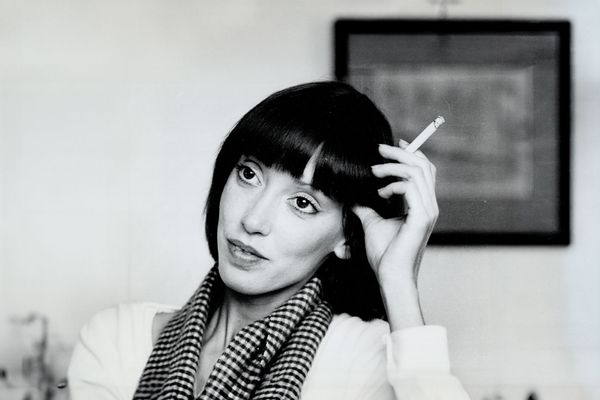
Shelley Duvall never wanted to be a celebrity. She wanted to be a scientist.
In a clip of a 1984 appearance on "Late Night with David Letterman," reposted on the show's YouTube page shortly after the announcement of her death at 75 on Thursday, she says as much herself. But watching this now — with her gone — and knowing how she struggled at the end of her life with feeling cast aside by an industry that is known for mishandling its eccentrics, the way Letterman treats her during their discussion is more revelatory than what she shares of her initial career goals.
After a visibly nervous Duvall tells Letterman that she was studying to be a research scientist before a chance meeting with Robert Altman in the '70s resulted in her landing her debut role in "Brewster McCloud," the host makes a punchline out of her, for no reason, in a very specific fashion that would be repeated by many others in her life, for as long as she lived it. Letterman pretends not to know what microbes are, or the meaning of the word vivisection. He asks her to name a scientific publication, and then another one, like a guy seeing a woman wearing a band t-shirt and then quizzing her on the albums the band has released. He plays a clip from "Shelley Duvall's Faerie Tale Theatre," the live-action anthology television series that she produced but, in this particular clip, didn't star in. And then he sends her on her way.

Duvall appeared as a guest on "Late Night" a total of 11 times during the early 1980s, and in each appearance, you could see her politely waiting for the respect she deserved but didn't receive. And the recirculation of the clip described above, amidst a sea of remembrances referring to her as an "Altman Protege" or the tormented wife in "The Shining," adds insult to injury.
Shelley Duvall's name can now be added to a long list of celebrities who were broken down by the industry, only to be honored in death, and this trend of after-the-fact RIP-ification only benefits the one doing it, not the ones who were desperate to hear it when they were still alive.
Mere months before she died, The New York Times published a feature on Duvall, in which she describes what led her to remove herself from the public eye and hole up in Texas, where she's from, to live a life of relative isolation with her partner, Dan Gilroy.
“I was a star; I had leading roles,” she says to writer Saskia Solomon. "People think it’s just aging, but it’s not. It’s violence . . . How would you feel if people were really nice, and then, suddenly, on a dime? They turn on you? You would never believe it unless it happens to you. That’s why you get hurt, because you can’t really believe it’s true."
It's a common misconception that something in Duvall broke after being put through emotionally straining shoots during the making of "The Shining," but she's shot that down in several interviews, describing the experience of working with Stanley Kubrick as "a fascinating learning experience." Although petite and soft-spoken in her heyday, it took a lot more than waving an axe around for hours a day while screaming at the top of her lungs to break her. The injuries that befell her were more subtle than that, and more consistent.
Reading through past interviews with Duvall, there are plentiful examples of her openly and warmly dishing out the love she hoped to receive in return.
Speaking to The New York Times in 1977, she praised Altman saying he, "has a great confidence in me, and a trust and respect for me, and he doesn’t put any restrictions on me or intimidate me."
He returned with what, now, seems insulting, saying she, “was able to swing all sides of the pendulum: charming, silly, sophisticated, pathetic, even beautiful.”
"Even" beautiful. A qualifier. Downplaying her unique looks, which made her special. Which made her stand apart from the rest.
These things can add up in a person. And they did.
When I think of Duvall, the image that comes to mind is her as Olive Oyl in "Popeye," the 1980 musical comedy directed by Robert Altman that she starred in alongside Robin Williams. Having obsessed over that film as a child, I can still hear her singing, "He's not a mandolin (Oh no). He's an accordion. I'll have to squeeze him each night to keep him warm."
She wasn't a mandolin either. Or an accordion for that matter. And that was a good thing. Should have always been a good thing.
In 2016, Duvall made a rare appearance on Dr Phil’s daytime talk show. This would have been a great time for everyone to love-bomb her. Not years after the fact. After she's dead.
“I’m very sick. I need help,” she said at the time.
“Shelley still refused to take any medications, and she would not sign the paperwork required to treat her,” Dr. Phil said in the wake of this appearance.
“It did nothing for her,” Gilroy, with her till the end, told The New York Times when asked about that appearance. “It just put her on the map as an oddity.”
What could have been done between then and now? Quite a lot, I'd imagine.
But it's too late now.







